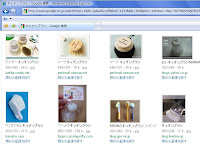Food Safety, Post March 11 In Japan

Speaking from the view point of food safety and consumers rights, which I have been working on for the past 15 years or so, there is a lot of confusion in Japan right now, and I am not in a position to say anything with great certainty. So is our food "safe" or not? Is enough done to actually check the many different radioactive isotopes and dangerous substances...?
Miyagi prefecture just released official data that you may want to ponder.
http://www.pref.miyagi.jp/kokusai/en/accidents_fukushima_nuclear.htm
This is the prefecture just north of Fukushima. I visited Miyagi last month, and of course, I do hope they can recover and get back to "normal" as soon as possible.
As you can see, no iodine can be found, but some cesium remains. The levels are around 3-34 Bq/kg in blueberry, bamboo shoot, and 49 Bq/kg in plums. Nothing detected in vegetables such as onions or radish. The "safe" limits are considered to be much higher, at 500 Bq/kg.
 I'd like to see a lot more testing done before anyone tries to say we are OK (or not).
I'd like to see a lot more testing done before anyone tries to say we are OK (or not).At the same time, I'm not very convinced that pregnant mothers and small children should be exposed to any of these substances. When I read that some food suppliers are encouraging their customers to "support" farmers in Fukushima, without much details as to what kind of testing have actually been done, I get worried. The Japan Times wrote about the "moral dilemmas" that we are faced with, and noted that Seikatsu Club, or Daiichi Mamoru Kai have campaigns to "Support Tohoku Farmers" or "Cheer Up by Eating" but that really is not a good idea for kids.
The Japan Times: Irradiated food poses moral dilemmas
"A lot of our suppliers happened to be concentrated in the Tohoku region, and one of our mushroom growers in Minami-Sanriku (in Miyagi Prefecture) was actually killed by the tsunami," he said. "There were many others whose homes, fishing boats and processing plants were washed away. Our biggest issue since the disaster has been how to support these people."
After the disasters, Daichi lost no time in appealing to its 100,000 members to donate money to its suppliers affected by the magnitude-9 megaquake and tsunami. It has raised ¥90 million so far, and the money keeps flowing in.
In contrast, another attempt by the group to help those farmers — by starting to market a range of vegetables grown in Fukushima and the surrounding Ibaraki and Gunma prefectures — has met with mixed reactions.
Fujita said that the company currently sells about 2,000 of these "Cheer Up by Eating" units every week to mostly elderly customers who buy the produce "out of feelings of gratitude for providing them with safe, organic food over the years."
But his office has also been bombarded with "cries for help" from customers with completely different sentiments. These callers — who numbered up to 2,000 a day after cesium levels twice the safety limit for infants were detected at a water-treatment plant in Tokyo in late March — were mostly young mothers with small children, he said, and they were skeptical of safety assurances from the government and demanding that Daichi provide less-irradiated food.
"Many of them said they would stop buying from us if we sold veggies containing ones from Fukushima and northern Kanto," Fujita said. "Others were anxious whether we could deliver mineral water, whether we were testing the veggies for radiation, and if they could really trust what the government says."
More testing is needed. Bloomberg noted on June 16 that only some 4,850 samples from 22 prefectures were tested for radiation. Japan has 1.68 million farms in Japan so if these numbers are correct, there clearly has not been enough proper testing done, at least not by mid-June.
Bloomberg: Food Safety Fears Grow in Japan on Skepticism at Radiation Testing Regime
The voluntary tests are conducted by prefectural governments in cooperation with local farmers, said Taku Ohara, an official in the ministry’s inspection and safety division. There’s no centralized checking system and many small farms aren’t tested, he said.Be that as it may.
“It’s difficult to take test samples from all farms because there are too many,” he said. “We have asked local governments to cover each of the farming regions and monitor them evenly.”
Tea, a very traditional Japanese product, has also been hit hard. The tea leaves are harvested in spring/early summer, and cannot be washed. Thus, the problem that radioactive particles remain in the final product. For vegetables, of course, a good wash (using a brush) might remove anything that is stuck on the surface.
Consumers (and hobby farmers) are left in doubt as to the long-term safety. Better get a good brush, unless you want to invest in a radiation meter.
Frankly, we do not know enough about radiation to really be confident to talk about "risk" or "damage" and if anyone starts to cry wolf, you had better ask, "does he/she really know what is going on?"



Comments